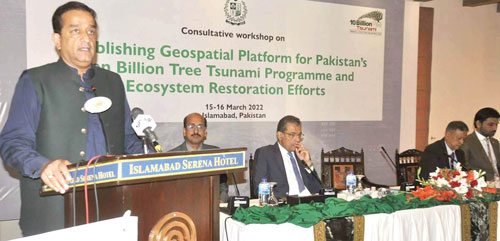Zubair Qureshi
Special Assistant to the Prime Minister on Climate Change, Malik Amin Aslam has said maintaining transparency and accountability was one of the key components of Ten Billion Tree Tsunami programme and the government always welcomed the engagement of international agencies.
He said Pakistan’s forest restoration journey started in 2014 with the investment in planting trees in Khyber Pakhtunkhwa province (KP).
Special Assistant to the Prime Minister on Climate Change was addressing the inaugural session of the two-day national workshop on “Establishing a geospatial platform for Pakistan’s Ten Billion Tree Tsunami Programme and ecosystem restoration efforts.”
The workshop is being jointly organized by the Ministry of Climate Change (MoCC) and the International Centre for Integrated Mountain Development (ICIMOD), Kathmandu-based non-governmental organisation for development of mountain areas in South Asia.
In his remarks Malik Amin highlighted that initiation of five-yearly State of The Forest Report for Pakistan, based on improved digital field data collection methods and a globally accepted classification approach to ensure transparent monitoring of existing forest as well as plantation under the TBTTP.
The workshop aims to initiate the groundwork for establishing a satellite remote sensing-backed geospatial platform to support ecosystem restoration efforts being made under the ministry’s Ten Billion Tree Tsunami Programme (TBTTP).
The SAPM informed the audience that the TBTTP was a nationwide initiative and had helped restore over one million hectares of degraded land across Pakistan so far. He further elaborated that the World Economic Forum, the United Nations Development Programme and the UN Food and Agriculture Organization have recognized the programme as the best replicable climate change mitigation and adaptation initiative.
Most recently, the United Nations Environment Programme (UNEP) termed Prime Minister Imran Khan’s Ten Billion Tree Tsunami Plantation (TBTTP) vision as a “Global Leader” initiative.
Director General of the Kathmandu-based non-governmental organisation for development of mountain areas in South Asia, Dr Pema Gyamtsho highlighted the significance of the Hindu Kush Himalaya region that is blessed with rich biological diversity.
He highlighted the significance of the Hindu Kush Himalaya region that was blessed with rich biological diversity and provides critical ecosystem services essential for food security and livelihoods of 1.9 billion people living in the mountains and the river valleys downstream. “The impacts of ecosystem degradation are now visible in the form of increasing frequency and intensity of natural calamities, threatening livelihoods and adding to the suffering and loss of human lives.”, he said.
He recognized the vision of Pakistan’s leadership which took the challenge of reversing ecosystem degradation while meeting the increasing livelihood demands in the mega initiative of the TBTTP.








